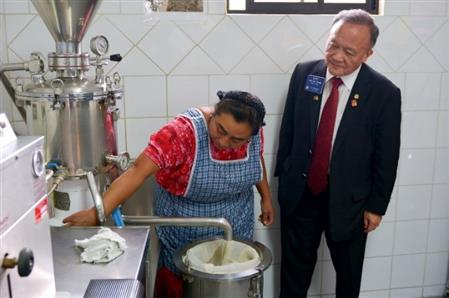
Project Growth:
Since its inception, the mechanical cow project has expanded over time in both breadth and depth and still ongoing.
The first machine was installed at the Proximos Pasos Girls School in Santa Maria de Jesus which serves about 250 girls now – a growth from 125 girls in 2012.
This was followed by installation and operation of two more machine at Sumpango municipality in February 2015 serving over 1000 children.
Finally, we have partnered with Guatemala Asuncion Rotary Club, District 4250 to install five more machines. These machines will be operated by five independent Cooperating Organizations at five different locations. In addition, each of these organizations will have direct oversight from a local Rotary Club close to their site as shown below. We expect these facilities to be fully operational in early 2018.
1. Rotary Club of Antigua will monitor Corazón de los Niños at San Pedro Las Huertas, Sacatepéquez
2. Club Rotario Guatemala Sur will monitor Mission Impact at Santa Lucia Milpas Atlas, Sacatepéquez
3. Rotary Club of Metrópoli will monitor Casa Aleluya at San Bartolomé Milpas Altas, Sacatepéquez
4. Club Rotario Gualán will monitor Esperanza de Vida at Rio Hondo, Zacapa; and Huertas in Motón – Asociación Civil de Corazones en Movimiento, Gualán, Zacapa
Each of these organizations are investing a great deal of resources including space, manpower, funds, time and energy for overall management of the project and community outreach.
The soy milk generated from eight machines collectively will serve over 4000 children in alleviating their malnutrition condition. The okara will help prepare protein rich food items for hundreds of families and microenterprise for tens of women.
How does the mechanical cow work?
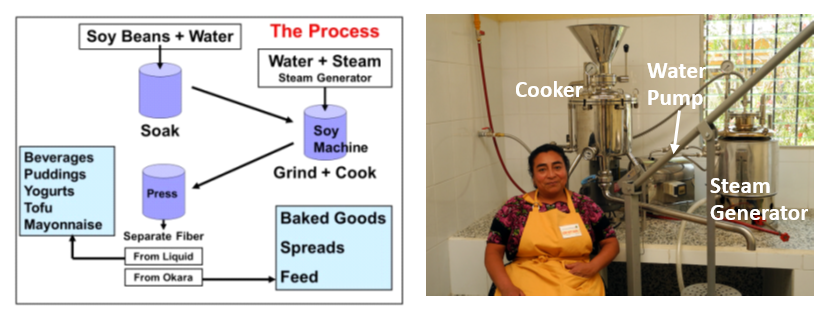
The mechanical cow can be considered as a simple pressure cooker. Soaked soy beans are poured in the cooker from the top funnel. Water is added and steam generated separately in a steam generator is injected. These ingredients are cooked for about fifteen minutes while a motor at the bottom grinds the contents.
A slurry like product is then taken out and processed through a press to separate the liquid soy milk from the solid okara.
The soy milk is cooled and ready for consumption. It can be flavored to desired taste.
Okara is used as an ingredient for many of the food products to enhance protein intake.
The machine generates 17 liters of milk per batch. The machine can be operated continuously for an eight-hour shift having approximately eight batches per day.
Soy milk is distributed to the children in the nine villages of Sumpango Municipality. Okara is distributed to women entrepreneurs engaged in microenterprise and to local women in these communities for their use to prepare food products.
Soy milk distribution:
The Sumpango municipality arranges for the distribution of milk to children in several villages. A police vehicle is used to carry the milk to the site and the staff then distributes the milk to the kids. To avoid any contamination of the soymilk, we have children come to a central location with their mothers. They are provided milk which needs to be consumed onsite. Some milk distribution photos follow:
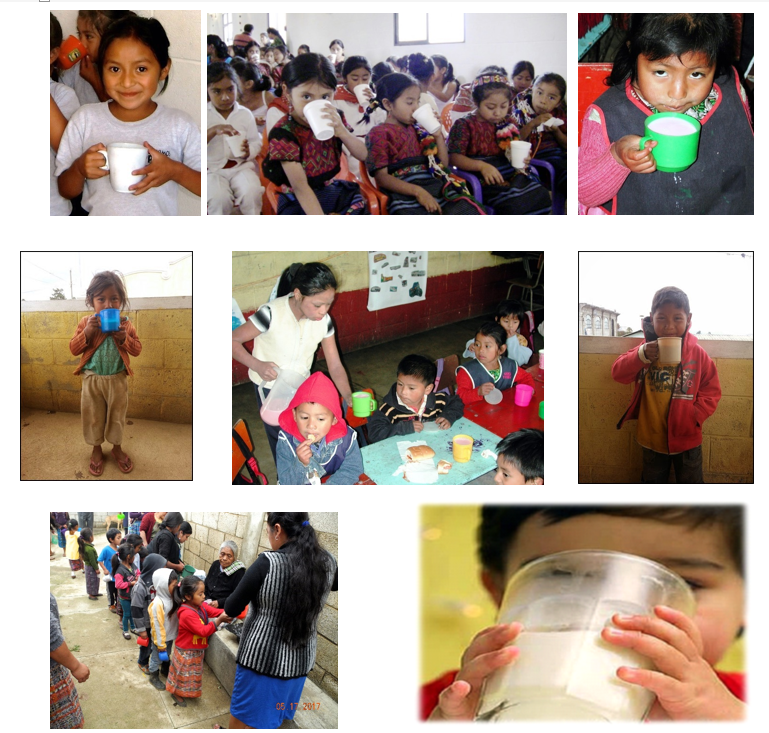
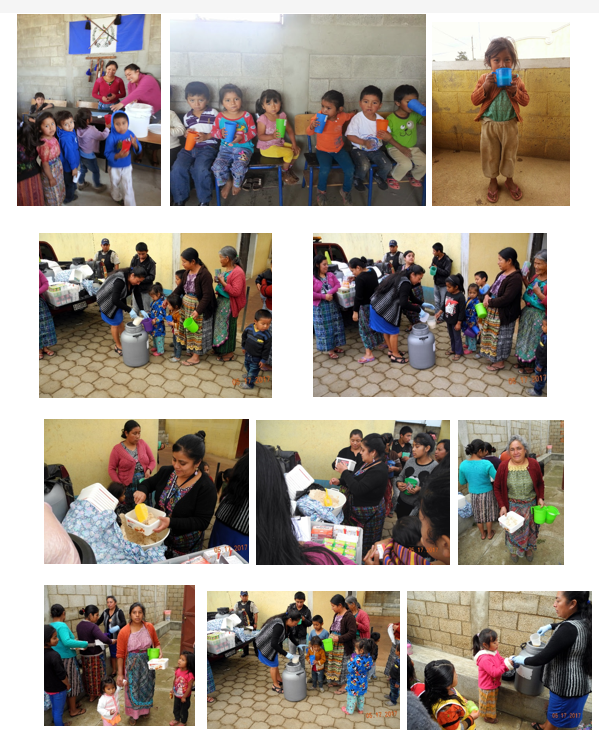
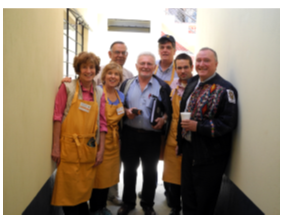

Host Club Partnership: We are fortunate to have the partnership of Club Rotario Guatemala Sur, District 4250. Their members are dedicated, committed, hard-working and passionate. They get things done!! A dozen members committed themselves to these projects going to Sumpango on a weekly basis to oversee progress and plan future activities.
Funding Partnerships: The Barrington Breakfast Rotary Club, District 6440 created “partnerships” among our Rotary friends within multiple districts and clubs – a hallmark of a Rotary’s Four Way Test: “Will it build goodwill and better friendships?” Major contributions came from District 6440 and District 7820 clubs along with DDF. Other contributing districts are: 4250, 6060, 6330, 6450, 6650, 6930 and 7040. We created a multi-country, multi-district and multi-club partnership.
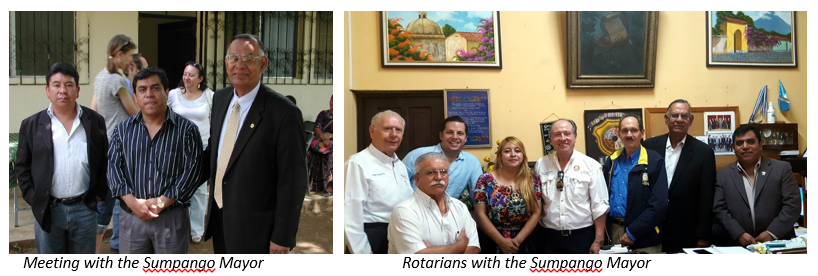
- Over4,000 children in the age group 1-5 years will be receiving soy milk to address their chronic malnutrition issues
- Dozens of pregnant and nursing women will be receiving soy milk to help growth of the new born
- Hundreds of families will be receiving okara to blend with their tortilla flour to enhance protein intake for the entire family
- Dozens of women will be engaged in microenterprise to start their own businesses to make and sell okara fortified food products.
- Our project responded to the NEEDS identified through many meetings with community members and leaders over a long period.
- We built alliances among people with various stakes to come together and define, implement, and enjoy the benefits. This involved the Sumpango Municipality Government, school principals and teachers and various NGOs. The community people in various trades contributed sweat equity with their time and effort to build things required for the projects.
- We created “partnerships” among our Rotary friends within multiple districts and clubs – a hallmark of Rotary’s Four Way Test: “Will it build GOODWILL and BETTER FRIENDSHIPS?”
- Relationships that have developed over these years are significant. We have all developed a greater understanding and appreciation of each other. We are also building an international community. This aligns with Rotary's commitment to promoting understanding, goodwill and peace.
- There is an impact as well on us as individual Rotarians having a sense of satisfaction and accomplishment.